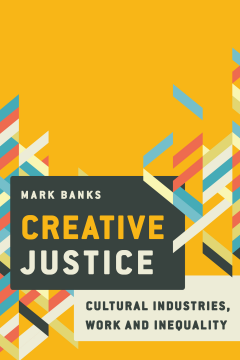
Additional Information
Book Details
Abstract
Creative Justice examines issues of inequality and injustice in the cultural industries and cultural workplace. It first aims to ‘do justice’ to the kinds of objects and texts produced by artists, musicians, designersand other kinds of symbol-makers – by appreciating them as meaningful goods with objective qualities. It also shows how cultural work itself has objective quality as a rewarding and socially-engaging practice, and not just a means to an economic end. But this book is also about injustice – made evident in the workings of arts education and cultural policy, and through the inequities and degradations of cultural work. In worlds where low pay and wage inequality are endemic, and where access to the best cultural academies, jobs and positions is becoming more strongly determined by social background, what chance do ordinary people have of obtaining their own ‘creative justice’?
Aimed at students and scholars across a range of disciplines including Sociology, Media and Communication, Cultural Studies, Critical Management Studies,and Human Geography, Creative Justice examines the evidence for – and proposes some solutions to - the problem of obtaining fairer and more equalitarian systems of arts and cultural work.
'An intriguing exploration of the difficulty of evaluating cultural work and cultural objects. In this excellent book, Mark Banks carefully unpicks the theoretical accounts that reduce artistic value to either a social construction or a crude economic calculation. Instead, he seeks to reclaim gradations of 'good' in both practices and products, while at the same time exposing the distortions within the contemporary cultural industries that result from increasing social inequality.'
Stephanie Taylor, The Open University
In recent years, theoretically informed and normatively committed critique has been in short supply in the cultural field. Consultants’ reports and the dreary output of policy wonks have conquered the imaginative space. In this book, drawing on several critical traditions, Mark Banks has broadened the scope of debate, taking culture ‘in itself’ seriously. By daringly constituting ‘creative justice’ as an object and vantage-point he skewers current delusions about the nature of cultural work and education and proposes remedies to present inequalities. But will he be heeded?
Philip Schlesinger, Professor in Cultural Policy, University of Glasgow
Banks demolishes the "creative industries" hype about the new meritocracy of cultural work. Balancing data analysis with social theory, his valuable study shows that, after a brief interregnum when absolute beginners were able to scale the heights, the cultural sector is once again becoming a domain of class consolidation.
Andrew Ross, Professor of Social and Cultural Analysis, New York University, USA; author of Nice Work If You Can Get It: Life and Labor in Precarious Times
Mark Banks is Professor in the Department of Media and Communication at the University of Leicester. His interest is in the cultural and creative industries, especially in relation to work and identity, employment, cultural policy and cultural value. He is the author of The Politics of Cultural Work (2007) and co-editor of Theorizing Cultural Work (2013, with Rosalind Gill and Stephanie Taylor). In 2016 he was appointed as the Director of the Cultural and Media Economies Institute (CAMEo) at the University of Leicester.
Mark Banks makes music out of the social necessity of normative judgement. Creative Justice starts by “paying respect” to the cultural object and subject in normative reasoning and action. How do we advance it? By seeking parity of cultural participation, robust economic redistribution of cultural opportunity and enforcement of fair pay, but especially by facing the paramount responsibility to reduce harm in a world where horrific harms of hate and extreme thought threaten to engulf popular reason. Yes, justice can be done. And it may be creative.
Catherine Murray, Professor of Gender, Sexuality and Women’s Studies at Simon Fraser University, Vancouver, Canada
